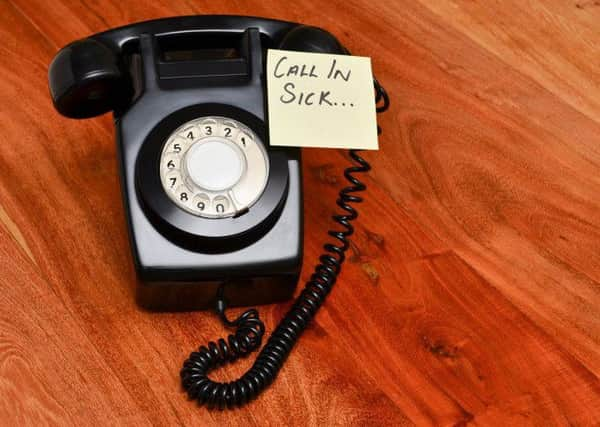Revealed: The UK's ten worst sickie excuses used to get out of work


A new study, by job site CV-Library, surveyed 1,300 workers across the country to find out attitudes towards absences and along the way found some of the most bizarre justifications staff have given their boss.
As for why staff sent in such unusual explanations, tiredness was found to be the most common given reason for taking the day off, accounting for 43.4 per cent of all sick days.
Advertisement
Hide AdAdvertisement
Hide AdHowever, almost a fifth of employees admitted giving their boss a fake excuse to get out of work, with over two-thirds having overhead a colleague doing the same.
Just 15.1 per cent simply “couldn’t be bothered”, while fewer than one in ten said their sickie was covering for a genuine hangover.
The ten worst sickie excuses
“I have blisters from wearing new shoes on Saturday night”
“I’ve got a terrible migraine (also known as a hideous hangover)”
“My hamster is sick and needs to go to the vet”
“I left my work uniform on the bus”
“I lost a darts tournament last night and I am too traumatised to come in”
Advertisement
Hide AdAdvertisement
Hide Ad“A tree has fallen down onto my property and it needs to be cleared/made safe”
“My boyfriend changed his relationship status on Facebook to single”
“There are cows in my garden so I can’t get to work”
“ I didn’t get to bed until late so I’m too tired to come in”
“I’m having a BBQ at the weekend and need time to prepare”
Commenting on Britain’s worst sickie excuses, CV-Library founder Lee Biggins said employees had begun to realise their decisions “have a wider impact on their team and workload”.
Advertisement
Hide AdAdvertisement
Hide AdOverall, 52.5 per cent workers admitted they felt guilty taking days off through illness. Of the conscious majority, over half recognised leaving their team in the lurch as unfair. This rose to 60.5 per cent in female respondents.
Meanwhile, almost a quarter of all workers realised taking unnecessary sick days reflected poorly on their work ethic.
Despite the extent to which staff were going to evade a working day, 86 per cent said their employer understood when they needed to take a sick day.
“While it’s all too easy to come up with an excuse for not turning up to work, it’s important to think about the bigger picture and wider implications of your absence, especially when it’s not 100 per cent necessary,” Biggins added.
Advertisement
Hide AdAdvertisement
Hide Ad“Whether you’re in part-time work, or are well into your career, you’re going to be more trusted by your employer if you’re honest and open with them – you never know, they may grant you a bit of time out if you really do need it.”
Despite Britons becoming more creative in their excuse, figures from the Office for National Statistics (ONS) recently suggested the country was taking fewer sick days than ever.
In 2016, 137m working days were lost through sickness and injuries – equivalent to 4.3 days per worker – a steep decline on the 185m sick days registered in 1999.
The figures proved that the UK’s reputation for throwing sickies was “a myth”, according to Frances O’Grady, general secretary of the TUC.
Advertisement
Hide AdAdvertisement
Hide Ad“We are really a nation of mucus troopers, with people more likely to go to work when ill than stay at home when well,” O’Grady commented.
“Let’s not forget that working people put in billions of pounds’ worth of unpaid overtime each year.”